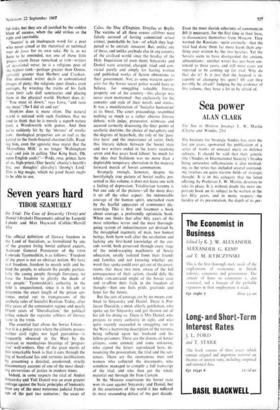Seven years hard
TIBOR SZAMUELY
On Trial: The Case of Sinyaysky (Tertz) and Daniel (Arzhak) Documents edited by Leopold Labedz and Max Hayward (Collins/Harvill 42s) The official definition of literary freedom in the Land of Socialism, as formulated by one of the greatest living Soviet cultural experts, Assistant General Prosecutor of the USSR Comrade Tyomushkin, is as follows: 'Freedom of the press is not an abstract notion. We have real freedom, freedom to march with and be- hind the people, to educate the people, particu- larly the young people through literature, we have the freedom to glorify the deeds of our people.' Tyomushkin's authority in the field is unquestioned, since it is his job to determine the exact length of the prison sen- tences meted out to transgressors of the aesthetic rules of Socialist Realism. Today, after fifty years of the communist regime and nearly fifteen years of 'liberalisation,' the political police remain the supreme arbiters of literary taste in the USSR.
The essential fact about the Soviet Union— that it is a police state where the citizens possess neither civil rights nor legal guarantees—is frequently obscured in the West by the ignorant or mendacious bleatings of 'progres- sive' well-wishers. One of the great merits of this remarkable book is that it cuts through the fog of barefaced lies and tortuous justifications by presenting a detailed, unadorned, strictly documentary account of one of the most shock- ing perversions of justice in modern times.
Indeed, in some respects the trial of Andrei Sinyaysky and Yuli Daniel was an even greater outrage against the basic principles of humanity than any of the most notorious judicial frame- ups of the past two centuries: the cases of
Calas, the Duc d'Enghien, Dreyfus or Beylis. The victims of all these causes celebres were falsely accused of having committed actual crimes, punishable by law—of which they hap- pened to be entirely innocent. But, unlike any of these, and unlike anybody else in any country of the civilised world since the heyday of the Holy Inquisition (if even then), Sinyaysky and Daniel were arrested, charged, tried and con- victed purely and simply for having written and published works of fiction obnoxious to their government. Not, as some western apolo- gists for the Soviet secret police would have us believe, for smuggling valuable literary property out of the country—this charge was never even mentioned—but exclusively for the contents and style of their novels and stories. It was a manifestation of 'Socialist humanism' at its finest. The court proceedings resembled nothing so much as a rather abusive literary debate, with judge, prosecutor, witnesses and accused earnestly discussing the finer points of aesthetic doctrine, the choice of metaphors and the degrees of hyperbole, the role of the 'posi- tive hero' and the importance of satire. Only this literary debate between the Soviet state and two writers ended in the losers receiving seven and five years hard labour. So much for the idea that Stalinism was no more than a deplorable temporary aberration in the majestic forward march of Soviet communism.
Strangely enough, however, despite the horrifyingly true picture of Soviet reality pre- sented in this volume, it does not leave one with a feeling of depression. Totalitarian tyranny is but one side of the picture—all the more does it set off the other aspect: the indomitable courage of the human spirit, uncrushed even by the fearful apparatus of communist dic- tatorship. This is first and foremost a bOok about courage, a profoundly optimistic book. When one thinks that after fifty years of the most relentless terror and the most thorough- going system of indoctrination yet devised by the misapplied ingenuity of man, two human beings, both born well after the revolution and lacking any first-hand knowledge of the out- side world, both processed through every stage of the mind-warping machinery of Soviet education, totally isolated from their friends and families and not knowing whether any word they spoke could ever get out of the court- room, that these two men, aware of the full consequences of their action, should defy the whole concentrated might of the Soviet state and re-affirm their faith in the freedom of thought—then one feels pride, gratitude and hope for the future.
But the acts of courage are by no means con- fined to Sinyaysky and Daniel. There is Pro- fessor Duvakin, a meek elderly gentleman, who spoke up for Sinyaysky and got thrown out of his job for doing so. There is Mrs Daniel, who protests to every authority in sight, and who quite recently succeeded in smuggling out to the West a harrowing description of the tortures being inflicted upon her husband and his fellow-prisoners. There are the dozens of Soviet citizens, some eminent and some unknown, who signed the letters reproduced here, de- nouncing the prosecution, the trial and the sen- tences. There are the anonymous men and women who collected the documents, who somehow managed to compile a full transcript of the trial, and who then got the whole material out through the Iron Curtain.
In the Moscow courtroom the Soviet state won its case against Sinyaysky and Daniel, but in the courtroom of the world it has suffered its most resounding defeat of the past decade.
Even the most slavish adherents of communism felt it necessary, for the first time in their lives, to disassociate themselves from Moscow. They warned the Russians—quite correctly—that the trial had done them far more harm than any- thing ever written by the two heretics. Yet the Soviets seem to have disregarded the anxious admonitions: another writer has just been sen- tenced to three years, and still more cases are reported to be coming up for trial. Why do they do it? Is it just that the leopard is in- capable of changing his spots? Or can they possibly be afraid? Judging by the evidence of this volume, they have a lot to be afraid of.


































 Previous page
Previous page